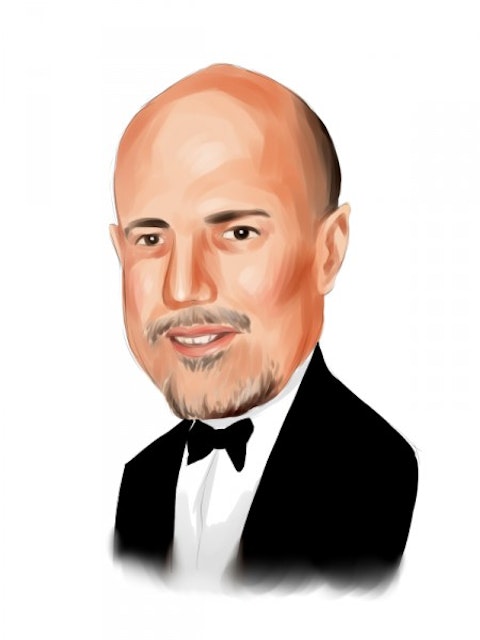In this article, we examined billionaire Rob Citrone’s portfolio management strategy and approach to investing in stocks. We also reviewed 10 stocks billionaire Rob Citrone is selling. You can skip our detailed discussion about Rob Citrone’s investment philosophy and portfolio management strategies and jump directly to Billionaire Rob Citrone Is Selling These 5 Stocks.
Billionaire Rob Citrone’s macro-analysis-driven strategy of investing in emerging markets has garnered an annualized return of 17% since he founded Discovery Capital Management in 1999. Citron, who was a wrestler in high school and currently owns a stake in the Pittsburgh Steelers, earned a bachelor’s degree from Hampden-Sydney College and completed his M.B.A from the Darden School of Business. His career began as a corporate bond analyst at Fidelity Investments in 1990, and in 1995 he joined Tiger Management as an investment analyst under the legendary Julian Robertson.
Citrone’s flagship Discovery Global Fund returned 27.5% in 2013, whereas his worst performance came in 2008 when he lost 33%. In 2021, he made some interesting portfolio changes. Initially, he reduced his stakes in tech stocks during the first quarter, but then boosted his holdings in these growth companies after the price dip in the second quarter. As of September, close to 56% of the $1.33 billion worth of his hedge fund’s 13F portfolio was concentrated in the information technology sector.
Besides a huge stake in the information technology sector, his firm has spread its investments across 11 sectors. The finance, utilities, and energy sectors have been among his preferred investment areas in 2021.
Instead of holding stocks for the long term, Citrone’s hedge fund seeks to profit from short-term price movements and market trends. In the third quarter, the firm sold several stock positions, either to realize price gains or to protect losses. The largest stock sales include Meta Platforms, Inc. (NASDAQ:FB), Micron Technology, Inc. (NASDAQ:MU), ASML Holding N.V. (NASDAQ:ASML), Palantir Technologies Inc. (NYSE:PLTR), and General Motors Company (NYSE:GM).
In addition, the billionaire hedge fund manager slashed his stakes in Alphabet Inc. (NASDAQ:GOOG) and Microchip Technology Incorporated (NASDAQ:MCHP) by 70% and 32%, respectively. Investors gained from both of these stocks in the aftermath of the pandemic. The stock price of Alphabet Inc. (NASDAQ:GOOG) has surged 70% so far this year amid rising ad revenues, while shares of Microchip Technology Incorporated (NASDAQ:MCHP) are up 26%.

Billionaire Rob Citrone of Discovery Capital Management
Our Methodology
This analysis was conducted using Discovery Capital Management’s 13F portfolio as of the third quarter. The following is a list of stocks that the hedge fund completely sold off in the third quarter of 2021.
Billionaire Rob Citrone Is Selling These 10 Stocks
10. Meta Platforms, Inc. (NASDAQ:FB)
Number of Hedge Fund Holders: 248
Billionaire Rob Citrone sold his stake in Meta Platforms, Inc. (NASDAQ:FB) during the third quarter. His firm had initiated a position in Meta Platforms, Inc. (NASDAQ:FB) during the first quarter of 2021. Shares of Meta Platforms, Inc. (NASDAQ:FB) surged 20% year to date.
Like Alphabet Inc. (NASDAQ: GOOG), hedge funds are bullish about Meta Platforms, Inc. (NASDAQ:FB). Of the 867 hedge funds tracked by Insider Monkey, Meta Platforms, Inc. (NASDAQ:FB) was in 248 hedge funds’ portfolios as of September.
In the third quarter investor letter, Jefferies Group, an investment management firm, mentioned a few stocks including Meta Platforms, Inc. (NASDAQ:FB). Here is what Jefferies Group stated about Meta Platforms, Inc. (NASDAQ:FB):
“While still early, FB is in the process of building the platforms that will ultimately support the development the Metaverse. We look at FB’s position through the lens of 4 current investment initiatives: 1) Oculus VR hardware, 2) Smart glasses, 3) Augmented Reality lenses, and 4) “Horizon Workrooms”
Oculus Virtual Reality hardware: Since acquiring Oculus in 2014 ($2B deal), FB has been focused on developing best-in-class hardware and complementary software & services to support VR experiences. The Oculus Quest 2 is FB’s newest VR headset; it retails at $299 and allows users to play games, try fitness classes, play sports, and watch concerts in virtual environments. Most importantly, Quest 2 is linked to users’ Facebook accounts, which means users can seamlessly connect with friends in virtual environments to play games or spend time together. We believe one of FB’s biggest differentiators in VR is its large array of non-gaming experiences that were designed for Oculus. For instance, users can explore extreme terrain in National Geographic Explore VR, join virtual fitness classes, or simulate being a chef. As FB’s hardware continues to improve and becomes less cumbersome, we would expect a flywheel of greater developer and user adoption of VR…” (Click here to see the full text).
9. Micron Technology, Inc. (NASDAQ:MU)
Number of Hedge Fund Holders: 63
In the third quarter, billionaire Rob Citrone sold all of his Micron Technology, Inc. (NASDAQ:MU) stock. He had initiated a position in Micron Technology, Inc. (NASDAQ:MU) in early 2020 and substantially lifted his stake in the company during the first half of 2021. Shares of Micron Technology, Inc. (NASDAQ:MU) underperformed so far in 2021.
Other hedge fund managers have also slashed their stakes in Micron Technology, Inc. (NASDAQ:MU) during the third quarter. The number of long hedge funds’ positions declined to 63 as of September compared to 87 positions in the previous quarter.
Hazelton Capital Partners, an investment management firm, stated in the third quarter investor letter that shares of Micron Technology, Inc. (NASDAQ:MU) can fall during a global chip shortage. Here is what Hazelton Capital Partners said about Micron Technology, Inc. (NASDAQ:MU):
“It’s hard to explain how shares of Micron Technology, manufacture of DRAM and NAND semiconductor chips, can fall during a global chip shortage. In most industries, focusing on demand can give you a clear insight into what lays ahead for a company. Today, the memory and storage chip industry is no different. However, in the past, companies focused on market share led to the reckless build out of chip fabrication plants (FABs), oversupply, falling average selling prices (ASPs) of memory and storage chips, lower margins, and declining cash flows. As the industry consolidated – there are now just 3 major producers of DRAM and 5 on the NAND side – rational behavior among the key players began to take hold as competitors began focusing more on R&D. Currently, chip pricing remains cyclical although less so than in the past and that cyclicality has a long-term upward bias. The ongoing transition to newer and more robust platforms (3D 176-layer NAND & 1-Alpha node DRAM) has provided the memory and storage chip industry with improved supply capacity under its current manufacturing footprint, ultimately pressuring ASPs. Over the past three years, as most of the large platform conversions have already taken place, being able to add more bits per wafer has reached a saturation point. With no major FAB build outs planned in the near-term by competitors Samsung or SK Hynix, constrained supply and flattening cost curves should lead to durable and upward sloping ASPs once the recent volatility from the chip shortage subsides.
Currently Micron Technology trades at just 8x 2022 estimate earnings. MU is expecting growth in both DRAM and NAND not just from the supply of more chips to data centers, artificial intelligence, the auto sector, and mobile devices, but also from greater demand for gigabyte capacity per unit within those segments. With a healthy balance sheet, improving return on invested capital, and expanding cash flows, not only should Micron benefit from improving future earnings but its multiple should also reflect the transition to a flattening cost curve.”
8. ASML Holding N.V. (NASDAQ:ASML)
Number of Hedge Fund Holders: 41
Billionaire Rob Citrone first initiated a position in ASML Holding N.V. (NASDAQ:ASML) early in 2021 and added to his stake in the June quarter before exiting the position in the third quarter of 2021. The firm’s buying and selling strategy appears to be working because shares of ASML Holding N.V. (NASDAQ:ASML) soared around 56% year to date.
The number of long hedge funds’ positions in ASML Holding N.V. (NASDAQ:ASML) declined to 41 at the end of the third quarter from 44 in the previous quarter.
In the third quarter investor letter, Harding Loevner, an investment management firm, highlighted a few stocks including ASML Holding N.V. (NASDAQ:ASML). Here is what Harding Loevner stated about ASML Holding N.V. (NASDAQ:ASML).
“To keep innovating, foundries like those operated by TSMC and Samsung rely on capital equipment made by ASML, a Dutch company that enjoys a near-monopoly in lithography, a specialized process that allows for an increase in the density of transistors and their connections on each silicon wafer. The chips, in addition to getting denser, are also getting architecturally more complex, which presents a challenge for both chip designer and fabricator alike.”
7. Palantir Technologies Inc. (NYSE:PLTR)
Number of Hedge Fund Holders: 35
As of the end of the September quarter, billionaire Rob Citrone sold out his entire stake in Palantir Technologies Inc. (NYSE:PLTR). Palantir Technologies Inc. (NYSE:PLTR) markets software products for intelligence services. Palantir Technologies Inc. (NYSE:PLTR) has been under pressure since the beginning of this year due to investors’ shift to value stocks. On the other hand, growth stocks like Alphabet Inc. (NASDAQ: GOOG) benefited from economic reopening.
Palantir Technologies Inc. (NYSE:PLTR) was on elite hedge fund managers’ radar during the September quarter. Of the 867 hedge funds tracked by Insider Monkey, Palantir Technologies Inc. (NYSE:PLTR) was in 35 portfolios compared to 26 positions in the previous quarter.
6. General Motors Company (NYSE:GM)
Number of Hedge Fund Holders: 31
Billionaire Rob Citrone initiated a position in General Motors Company (NYSE:GM) in the June quarter and sold out the entire stake in the September quarter. Shares of General Motors Company (NYSE:GM) sored more than 40% since the beginning of 2021. Like Alphabet Inc (NASDAQ:GOOG), General Motors Company (NYSE:GM) is benefitting from economic recovery and ease in business restrictions.
General Motors Company (NYSE:GM) was in 77 hedge funds’ portfolios at the end of the third quarter of 2021 compared to 86 positions in the previous quarter.
In addition to General Motors Company (NYSE:GM), Citrone’s fund sold Meta Platforms, Inc. (NASDAQ:FB), Micron Technology, Inc. (NASDAQ:MU) and Palantir Technologies Inc. (NYSE:PLTR) in the third quarter.
Click to continue reading and see Billionaire Rob Citrone Is Selling These 5 Stocks.
Suggested articles:
- Top 10 Stock Picks of George Soros
- 10 Biotech Stocks in Billionaire Ray Dalio’s Portfolio
- Jim Cramer is Bearish on These 10 Stocks





